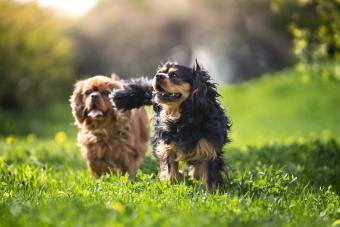
Dogs are one of the most intelligent animals in the world. They're very good at recognizing family members, and they can even tell some of them apart from others. However, this ability doesn't always extend to siblings. Sometimes, dogs seem confused by their brothers and sisters. Sometimes, older dogs can't even tell their own puppies apart! In this article, we'll cover how dogs recognize their siblings and how you can tell if your dog recognizes theirs.
Recognizing Siblings by Scent
If you want to know if your dog can recognize their siblings, the short answer is yes, at least probably. Dogs have a strong sense of smell. A dog's sense of smell is thought to be more than 10,000 times better than yours, so it makes sense that dogs can identify each other by smelling one another's scent.
This is called olfactory communication. Dogs also use this method to recognize us. When you come home after being away for a while, our dogs will sniff us eagerly, as if trying to verify that you're really who you say you are. So when it comes to being able to recognize one another, dogs definitely have an advantage.

The ability to recognize kin is important for many reasons. It allows dogs to avoid mating with close relatives and helps them find mates who are unrelated to them but still share genes that might be beneficial for offspring survival. In addition, being able to identify kin may help dogs reduce conflicts over food or territory by ensuring they don't fight with family members who share resources with them.
Separated Since Birth
Dogs that have been separated since birth might not recognize each other right away, or at all. It may depend on how early they were separated, and how long they have been apart. Dogs that are separated from siblings before they are 6 weeks old probably won't be able to pick their littermates out of a lineup. Older puppies raised with their siblings might remember them. And littermates who have been apart for 6 years or more may not remember their siblings.
Dogs may not recognize their siblings right away, either. It might take them some time to get used to each other's unique smells and behaviors before they are comfortable with each other's presence or let themselves be close to each other, like sleeping next to each other.
If you notice that your dog does not like being in the same room as their sibling, it could be because they do not recognize each other as family members. It could also be because they don't want to spend time with each other. Even human siblings don't always get along later in life, or enjoy each other's company.
Can Dogs Recognize Their Parents?
Research has found dogs can recognize their mother and father, although they are more likely to retain memories of their mother than their father. Findings suggest that dogs have the ability to form emotional bonds with their parents, as humans and other animals do.
According to research conducted by Juliane Kaminski of the University of Portsmouth in the United Kingdom, dogs are able to discriminate between their mothers and other females. This research raises the possibility that dogs may have a mental "template" of their mother.

How To Tell
It's difficult to determine whether a dog recognizes their siblings or parents based on body language alone. Dogs are generally good at recognizing their siblings, but it's hard to gauge if they can identify unique individuals in this way. Researchers are still identifying additional ways to identify how siblings can be recognized. However, there are some methods that could help you determine if your pup knows their sister or brother.
Here are some signs that your dog knows who their sibling or parent is:
- They play with them more often than other dogs.
- They're more affectionate towards each other than other dogs.
- You notice them following each other around the house. They may even take turns sleeping, eating and playing together!
Separation Makes a Difference
Dogs can probably recognize their siblings. But it seems that this isn't always the case. In one study, researchers separated four siblings from birth and did not reunite them until they were adults. When they were tested for signs of recognition, none of them showed any familiarity toward one another. However, a sample size of four is incredibly small, meaning it may not be entirely accurate.
There are some other studies that suggest that dogs often recognize their littermates after separation. For example, Dr. John Bradshaw and his colleagues at the University of Bristol in England split 10 mixed-breed puppies into two groups when they were 3 weeks old. One group stayed together with their mother for 8 weeks before being moved to another home.

They were still able to see her through a window, while the other group was raised by strangers until they were 8 weeks old and had no contact with their mother. Then, both groups were reunited and tested for signs of familiarity toward one another using various methods, such as eye contact or tail wagging.
The results showed it didn't matter whether they had been separated since birth. Both groups seemed equally likely to show signs of recognition when reunited.
Additional Research is Needed
It's clear that some dogs can recognize their siblings. However, it's difficult to determine how universal this is. The ability of dogs to recognize one another may have something to do with the way in which they interact with other animals and humans, but more research needs to be done before scientists know for sure. Since litters are so small, it's also difficult to obtain a fully accurate result. For now, take a look at how your dog and their siblings interact with one another. If they are more comfortable with one another than with other dogs, there is a good possibility they recognize one another as family members.







